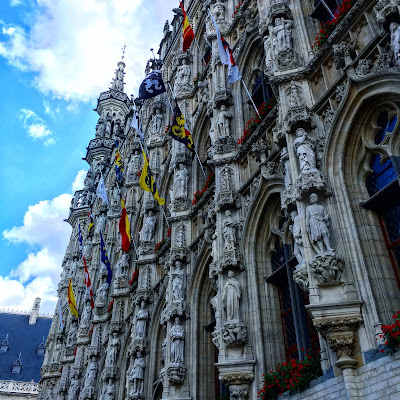 |
| Discovery Walks in familiar places. |
The only condition my brother-in-law had to drive his wife, a five-and-a-half-year-old daughter, a four-year-old son, and a one-year-old toddler 1,185km from Budapest to Dusseldorf was to see the North Sea. That was it. His wife, also wanting to dip her toes into the sea, happily conceded.
The actual drive
went alright, from what I was told. Two days of driving with a night's rest in
Bavaria. No crappy weather. No drama on the autobahn. The kids went into their
car seats without kicking, squirming, screaming, or any other drama – they're far
more well behaved than I remember me and my brother being on the family road
trips.
Although, there was
little room for squirming or kicking because the car was rammed full with a
playpen, a stroller with three different seat attachments, baby clothes in
heavy vacuum-sealed bags for the expected arrival of our own little
road-tripper.
They arrived on a
Thursday night – Kata's birthday. I worked in Aachen all day Friday, arriving in the evening to a
raucous apartment filled with three happy kids who spent the day at the
Dusseldorf Aquarium, walking along the Rhine, and being young tourists in the
Dorf. They were running from room to room, playing with their umbrellas, and
rolling around atop their air mattress. Their long march across the Dorf hasn't
seemed to tire them out.
We were back on the
road on the weekend, heading to Ghent. The kids, all settled into their car
seats had one tablet to share. The baby wasn't going to use it (she has little
hands and fell asleep before we left the Dorf), so the other two had to share it.
The older sister took it, telling her younger brother she was going to use this
tablet, but she had an invisible tablet he can use. She handed him the
invisible tablet, which he accepted. I don't now how long that
move will last, but I hope she gets a lot of mileage out of it.
The road were taking
was one Kata and I took two years before. We were driving towards Ghent, with a
stop in Leuven for a snack. Leuven is a fun place to stop. It's at a point on
the highway through Belgium where you think it might be wise to stop before you
hit Brussels ring road with its wild combination of reckless drivers, merging
lanes, and diplomatic license plates. Leuven's city hall is the real treat. You
don't see it until you turn a corner and then you walk right into a gothic
building covered with gilded stone and statues.
And Ghent?
And Ghent?
 |
| Instagram-able Ghent! |
Ghent is great. We had visited in the spring, so there weren't the August crowds in the streets of the old town like there was this time around. The canals, which were still when we visited, were choked with boats. The weather was far more warmer and sunnier. The Flemish summer can be amazing. And yet, the press of people and shoppers and cafe drinkers didn't push in on us. The town was beautiful when we visited in spring of 2016, but it felt livelier now and, in a way, better. I kind of envied the road warriors for seeing it the first time that way.
 |
| The umbrellas were the ultimate toy on this trip. |
Each place they visited, the kids brought along their colourful kid umbrellas (I think Kata told dreary rainy horror stories to her family in fairer-weathered Hungary). When we arrived at our airbnb in a Belgian hamlet, they took their umbrellas onto the big deck in the back, swung them around and played with them until the sun set behind the neighbouring deer farm.
We awoke the next
morning, packed up quickly and began the next leg of our super-quick road trip:
Bruges.
Everything you heard
about Bruges from that movie is true, but August is no time to visit. Unlike
Ghent, where the streets accommodate the visiting hordes and is made more
vibrant by them, Bruges felt like a stone and human vice. The streets were
choked with tourists. You could stop and appreciate a medieval building or snap
a photo of some pretty facade, but you'd risk being shoved by a ill-tempered
tourist trying to eat his waffle and walk and take a selfie at the same time.
Not a great place for several small child. But they have boats in Bruges! So
everyone piled in and saw Bruges properly.
And what about the
North Sea?
That was our first
stop in the morning. It was wild and windy at Ostend, so you had to wear a
windbreaker instead of a bikini, but we had the beach almost to ourselves. The
tide was out too, so we walked a desert-length of beach to reach the sea. Shoes
and socks were taken off and the adventurous travelers waded in as the tide
rolled in.
Of course, this whole odyssey was never just about the seeing the North Sea. It was also about family time. It was about the first of hopefully many family visits to Dusseldorf from the Hungarian side. It was about sharing the familiar and the new on the road together. And it was also about wiggling some toes in the Sea.
 |
| Reaching the North Sea. |






